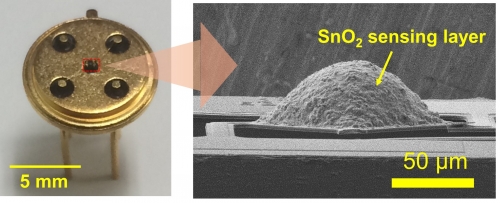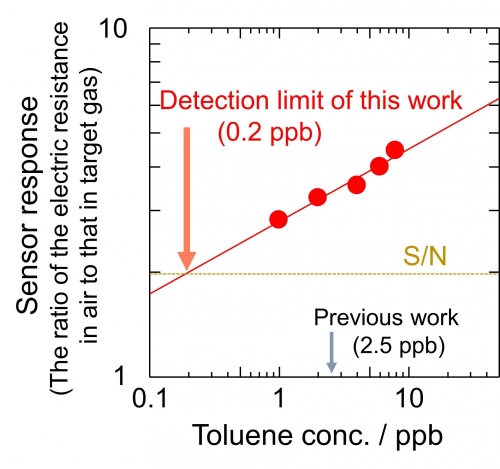研究成果 Research Results
- TOP
- News
- Research Results
- Ultra-high sensitive detection of organic gases using micro-sized gas sensors
Ultra-high sensitive detection of organic gases using micro-sized gas sensors
2018.09.05Research ResultsPhysics & ChemistryTechnology
The group of Prof. Kengo Shimanoe, Assoc. Prof. Ken Watanabe and Assis. Prof. Koichi Suematsu has succeeded in ultra-high sensitive gas detection in ppd level of volatile organic compounds (VOCs) by collaboration with Figaro Engineering Inc.
In order to detect diseases, especially cancers, through human-breath analysis, improvements in the responses of semiconductor gas sensors and reductions in their detection limits are required. In this study, the group introduced a heater-switching, pulse-driven, micro-sized gas sensor with micro-heater and a sensor electrode fabricated with Pd-loaded SnO2-clustered nanoparticles as the sensing material. The gas sensor was repeatedly heated and allowed to cool by the applied voltage to the micro-heater. Consequently, the utility factor of the pulse-driven sensor was greater than that of the conventional sensor with continuous heating. As a result, the response of the sensor to toluene was enhanced; indeed, the sensor responded to toluene at levels of 1ppb, which has been considered hard to detect. According to the relationship between its response and toluene concentration, it was confirmed that the pulse-driven sensor in this report can detect toluene at concentrations of 200 ppt and even lower.
The paper, ‘Pulse-Driven Semiconductor Gas Sensors Toward ppt Level Toluene Detection’ has been published in the journal of Analytical Chemistry-DOI: 10.1021/acs.analchem.8b03076
This work will be presented at The Ceramics Society of Japan The 31st Fall Meeting on 5-7, September, 2018 in Nagoya Institute of Technology.

SEM image of the micro-sized gas sensor using this work.

Toluene concentration dependence of the sensor response. The result indicates that the detection limit of the toluene is about 0.2 ppb.
Journal Reference
Pulse-Driven Semiconductor Gas Sensors Toward ppt Level Toluene Detection, ,Analytical Chemistry, 10.1021/acs.analchem.8b03076Research-related inquiries
- TOP
- News
- Research Results
- Ultra-high sensitive detection of organic gases using micro-sized gas sensors































